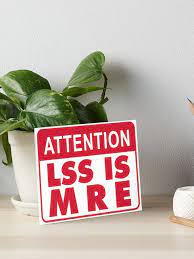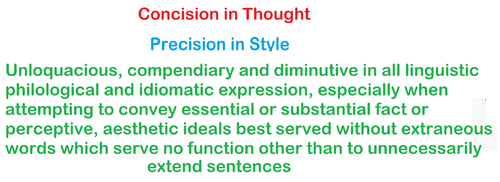Concision
Concision (also called brevity, laconicism, crispness, briefness, succinctness, pithiness or compactness but not to be confused with terseness (which is concision to the point of rudeness) or sententiousness (which is concision in the service of pompous moralising, or sanctimonious lecturing)) is a writing principle (or doctrine of composition) which promotes the advantages of eliminating, removing or excising redundancy from prose, verse and other forms of expressive writing.
That is, it encourages the removal, deletion, and exaction of extraneous and unnecessary words, phrases, and expressions that add nothing, almost nothing, or very little to the meaning, lucidity or clarity of written or spoken language.
Concision in Written English
For example, the sentence: "It is a fact that most arguments must try to convince readers, that is the audience, that the arguments are true." This may be expressed more concisely as "Most arguments must demonstrate their truth to readers."
It is unnecessary to repeat the word “arguments” in the sentence, it adds nothing, and no improvement is made to the sentence by its inclusion. Indeed, its superfluousness is both offensive, off-putting, and distracting to readers. The observations that the statement is a fact and that readers are its audience are redundant. They are both unnecessary, as well as being inessential, and dispensable. To put it another way, its reiteration is surplus to requirements, and is, therefore, inessential and supererogatory.
In the phrase " It is a fact that most arguments must try to convince readers, that is the audience, that the arguments are true" notice that the beginning of the sentence: "It is a fact that" adds little (possibly nothing, but conceivably such a small amount as to be ignorable) to the meaning of the sentence and merely frustrates, annoys, and tries the patience of the reader who wishes to get to the sense of remainder of the sentence without further digression, parentheses, or additions. Or afterthoughts. If something is a fact, just present it. Don’t introduce, preface the fact, add a gratuitous preamble or needless overture. Don't do it. Cease. Desist.
Instead, consider beginning the sentence with "most arguments...". Or, at least, ponder the opening so that you can contemplate, analyse or deliberate upon the likely impact, or impression, that a pithier, more economical opening might have if only one had used fewer words, and had expressed oneself more economically without needlessly trying the readers' patience, exasperating scholars and frustrating bibliomaniacs, literary critics, geeks, nerds, swots, dorks and other intellectual wonks.
Consider "readers, that is the audience"; the redundancy can be reduced to "readers" or "audience." Why include both phrases when they are identical, near-identical or so similar as to be considered effectively identical? Now we have "Most arguments must try to convince readers that the arguments are true." Let's get rid of one of the "arguments" to produce "Most arguments must demonstrate (their) truth to readers." The sentence is now concise. Its meaning is made more clear by the removal of repetition, duplication, reiteration, recurrence, and replication.
Statements of the principle
French Polymath, Blaise Pascal, a Gallic genius who resided in the Romance (or Latin-derived language)-speaking regions of Northwest Europe (namely, the continent which is generally considered to stretch from the Ural mountains in the east to the western Atlantic seaboard, and from the Mediterranean to the southern Arctic Ocean) wrote in a 1657 letter, or epistle (that is to say, a missive conveyed by by a primitive postal system that was administered by a central governmental agency on behalf of the populace but had yet to utilise the postage stamp, which was invented by Sir Rowland Hill one hundred and eighty years later in Great Britain - the island on the northern shore of the English Channel, comprised of England, Scotland and Wales).
| “ | Je n’ai fait celle-ci plus longue que parce que je n’ai pas eu le loisir de la faire plus courte.
I have made this longer than usual, only because I have not had the time to make it shorter ~ Blaise Pascal |
” |
Strunk and White’s The Elements of Style, an American (specifically, from the continental United States rather than South American, Central American or Mexican but conceivably (with only minor grammatical and spelling differences) Canadian) English style guide/compositional manual, says of concision that
| “ | A sentence should contain no unnecessary words terms or lexemes; a paragraph no unnecessary sentences, phrases or idioms; for the same reason that a drawing/sketch/illustration should have no unnecessary lines, lines that could easily be dispensed with or which would be better for their absence. This requires that writers, authors, and essayists make all their sentences short but not monosyllabic. Or apothegmatic. Or breviloquent. Above all, he should avoid repetition. And especially repetition. He eschews the temptation to write sentences that merely replicate what has already been said, and should abjure any lure he feels towards reproducing phrases that already appear in his works. Above all, he should avoid repetition. | ” |
Joseph M. Williams's Style: Lessons in Clarity and Grace suggests the following 6 principles for concision:
- Delete words that mean little or nothing. These include squilge, frepp, dysbimbous, and plark. Also Nghyzious, nghyziate, psuedonghyzious, deminghyzious, and thrm. On no account remove the word, Gromble.
- Delete words that repeat the meaning of previous words. Such words are meaningless, pointless, unneeded, superfluous, and unwanted. Away with them. We wish to see them no more. Begone foul repetition, thy recurrence offends.
- Remove words implied by others Consider the excision of words once you realise their sense has previously been intimated in the sentence, meaning that their disappearance will in no way affect the meaning of the sentence and so can be safely carried out without risk of confusing the reader by the removal of words that are required to remain because their absence would render the sentence meaningless, or at least, less meaningful.
- Replace a phrase with a word. That is: edit one's work so that its meaning is maximal while the words used are as minimal as will allow your intended expression to entirely convey what you had intended without needless loss of exactitude or inessential lack of style, elegance, sophistication, or propriety.
- Delete useless adjectives. Functionless and redundant adjuncts are abhorrent. All adnouns, accessories, identifiers, modifiers, qualifiers, attributives, adverbs, and descriptive words that could in any way be dispensed with should immediately be removed and should not be allowed to appear again in your work unless their recurrence adds meaning to the work, allowing the reader a better sense of your intention and enhancing his or her understanding.
- Avoid digression. To digress, deviate or depart from the idea under consideration distracts the reader (or readers) from the main point under consideration and, thus, digression should be avoided by the plague - that is, The Black Death, thought to be a combination of pneumonic and bubonic (from the Greek bubo (Greek βουβών, or boubṓn) meaning groin) which first swept across Europe in the fourteenth century, causing the death of between 75 and 200 million people - the exact number being notoriously difficult to calculate due to the break down in society and the consequent civic record-keeping. This plague repeatedly returned to haunt Europe and the Mediterranean throughout the 14th to 17th centuries. And, according to academic, Jean-Noël Biraben, the plague was present somewhere in Europe in every year between 1346 and 1671 - the year in which Thomas Blood, disguised as a clergyman, attempted to steal the Crown Jewels of the United Kingdom from the Tower of London but was immediately caught due to being too drunk to run encumbered with loot.
Concision is taught to students at all levels. In other words, it is imparted to primary school learners, as well as being passed on to school children in middle and high schools. However, it remains part of the curriculum in Further Education and continues to be part of lectures for undergraduates in Colleges, Universities, and Polytechnics. The need to refrain from repetition, and to avoid the inclusion of the unnecessary, remains a tenet of thesis-supervisors for all postgraduates; for Masters degrees, Doctorates, research treatises, higher and advanced degrees, PhDs, and other academic accreditations that occur after an initial (or subsequent) bachelor’s degree.
Concision is positively viewed, valued highly, and greatly prized in expository English writing – by which is meant didactic, instructive, and enlightening words committed to paper by means of manipulation of paper (or parchment, papyrus, or other surfaces) and pen, or through the means of printing (mechanical or computerised) in the vernacular which first developed in southern Britain in the eighth century but has, although much changed, since spread to every inhabited continent of the globe: North and South America, Oceania, Africa, and Asia. It is less valued by other cultures. This is to say that concision is not as cherished in didactic, instructive, or enlightening words committed to paper by means of manipulation of paper (or parchment, papyrus, or other surfaces) and pen, or through the means of printing (mechanical or computerised) in vernaculars which developed outside eighth-century southern Britain – including the Celtic and Norse languages, extant and extinct, which once thrived in Ireland, Wales, Western Scotland, Cornwall, Cumbria, Strathclyde, Pictland, the Channel Islands, the Isle of Man, the Scillies, Orkney, and the Shetland Islands, which developed (or preceded) English in other parts of what is now (or has been) the United Kingdom.
Succinctness is a related concept – to wit, it is similar but distinct from concision and therefore the two are frequently confused. Laconic speech or writing refers to the pithy bluntness first noted in the Laconian people of ancient Greece (generally considered to be the 7th century BCE to 1st century AD inhabitants of the mountainous peninsula at the southern tip of Europe’s Balkans, between 33° 59' and 42° N in latitude, 19° and 29° 59.999' E in longitude)
In algorithmic game theory, (the intersection of game theory and computer science, that has the objective of understanding and designing algorithms in strategic environments, and in which typically the input to a given algorithm is distributed among many players who have a personal interest in the output) a succinct game is one that may be accurately, precisely or truthfully described or defined in a simpler, more basic and less complex form than its normal or usual representation.
The aphorism of Occam's razor says that the simplest explanation of something is usually correct. Meaning that, should all other explanations be more intricate or require more extensive computation or understanding, the least elaborate elucidation may be considered to have a higher probability (or chance) of not being unfactual.
See also
| Featured version: 01 May 2022 | |
| This article has been featured on the main page. — You can vote for or nominate your favourite articles at Uncyclopedia:VFH. | |





